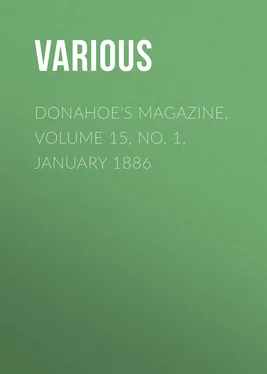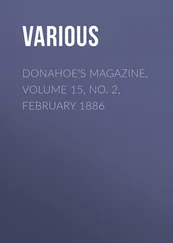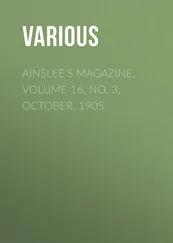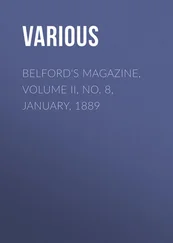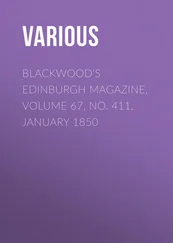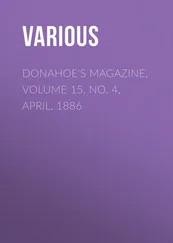Various - Donahoe's Magazine, Volume 15, No. 1, January 1886
Здесь есть возможность читать онлайн «Various - Donahoe's Magazine, Volume 15, No. 1, January 1886» — ознакомительный отрывок электронной книги совершенно бесплатно, а после прочтения отрывка купить полную версию. В некоторых случаях можно слушать аудио, скачать через торрент в формате fb2 и присутствует краткое содержание. Издательство: Иностранный паблик, Жанр: foreign_antique, periodic, foreign_edu, на английском языке. Описание произведения, (предисловие) а так же отзывы посетителей доступны на портале библиотеки ЛибКат.
- Название:Donahoe's Magazine, Volume 15, No. 1, January 1886
- Автор:
- Издательство:Иностранный паблик
- Жанр:
- Год:неизвестен
- ISBN:нет данных
- Рейтинг книги:3 / 5. Голосов: 1
-
Избранное:Добавить в избранное
- Отзывы:
-
Ваша оценка:
- 60
- 1
- 2
- 3
- 4
- 5
Donahoe's Magazine, Volume 15, No. 1, January 1886: краткое содержание, описание и аннотация
Предлагаем к чтению аннотацию, описание, краткое содержание или предисловие (зависит от того, что написал сам автор книги «Donahoe's Magazine, Volume 15, No. 1, January 1886»). Если вы не нашли необходимую информацию о книге — напишите в комментариях, мы постараемся отыскать её.
Donahoe's Magazine, Volume 15, No. 1, January 1886 — читать онлайн ознакомительный отрывок
Ниже представлен текст книги, разбитый по страницам. Система сохранения места последней прочитанной страницы, позволяет с удобством читать онлайн бесплатно книгу «Donahoe's Magazine, Volume 15, No. 1, January 1886», без необходимости каждый раз заново искать на чём Вы остановились. Поставьте закладку, и сможете в любой момент перейти на страницу, на которой закончили чтение.
Интервал:
Закладка:
But to exclude the Church which God Himself has constituted from the business of life, from the laws, from the teaching of youth, from domestic society, is a great and pernicious error. A well-regulated State cannot be when religion is taken away; more than needs be, perhaps, is now known of what sort of a thing is in itself, and whither tends that philosophy of life and morals which men call civil . The Church of Christ is the true teacher of virtue and guardian of morals; it is that which keeps principles in safety, from which duties are derived, and by proposing most efficacious reasons for an honest life, it bids us not only fly from wicked deeds, but rule the motions of the mind which are contrary to reason when it is not intended to reduce them to action. But to wish the Church in the discharge of its offices to be subject to the civil power is a great rashness, a great injustice. If this were done order would be disturbed, since things natural would thus be put before those which are above nature; the multitude of the good whose common life, if there be nothing to hinder it, the Church would make complete, either disappears or at all events is considerably diminished, and besides, a way is opened to enmities and conflicts—how great the evil which they bring upon each order of government the event has too frequently shown.
Such doctrines are not approved by human reason, and are of the greatest gravity as regards civil discipline, the Roman Pontiffs our predecessors—well understanding what the apostolic office required of them—by no means suffered to go forth without condemnation. Thus Gregory XVI., by Encyclical Letter, beginning Mirare vos , of August 15, 1832, inveighed with weighty words against those doctrines which were already being preached, namely, that in divine worship no choice should be made; and that it was right for individuals to judge of religion according to their personal preferences, that each man's conscience was to himself his sole sufficient guide, and that it was lawful to promulgate whatsoever each man might think, and so make a revolution in the State. Concerning the reasons for the separation of Church and State, the same Pontiff speaks thus: "Nor can we hope happier results either for religion or the government, from the wishes of those who are eagerly desirous that the Church should be separated from the State, and the mutual good understanding of the sovereign secular power and the sacerdotal authority be broken up. It is evident that these lovers of most shameless liberty dread that concord which has always been fortunate and wholesome, both for sacred and civil interests." To the like effect Pius IX., as opportunity offered, noted many false opinions which had begun to be of great strength, and afterward ordered them to be collected together in order that in so great a conflux of errors Catholics might have something which, without stumbling, they might follow.
From these decisions of the Popes it is clearly to be understood that the origin of public power is to be sought from God Himself and not from the multitude; that the free play for sedition is repugnant to reason; that it is a crime for private individuals and a crime for States to observe nowhere the duties of religion or to treat in the same way different kinds of religion; that the uncontrolled right of thinking and publicly proclaiming one's thoughts is not inherent in the rights of citizens, nor in any sense to be placed among those things which are worthy of favor or patronage. Similarly it ought to be understood that the Church is a society, no less than the State itself, perfect in kind and right, and that those who exercise sovereignty ought not to act so as to compel the Church to become subservient or inferior to themselves, or suffer her to be less free to transact her own affairs or detract aught from the other rights which have been conferred upon her by Jesus Christ. But in matters however in complex jurisdiction, it is in the highest degree in accordance with nature and also with the counsels of God—not that one power should secede from the other, still less come into conflict, but that that harmony and concord should be preserved which is most akin to the foundations of both societies.
These, then, are the things taught by the Catholic Church concerning the constitution and government of the State. Concerning these sayings and decrees, if a man will only judge dispassionately, no form of Government is, per se , condemned as long as it has nothing repugnant to Catholic doctrine, and is able, if wisely and justly managed, to preserve the State in the best condition. Nor is it, per se , to be condemned whether the people have a greater or less share in the government; for at certain times and with the guarantee of certain laws, such participation may appertain, not only to the usefulness, but even to the duty of the citizens. Moreover, there is no just cause that any one should condemn the Church as being too restricted in gentleness, or inimical to that liberty which is natural and legitimate. In truth the Church judges it not lawful that the various kinds of Divine worship should have the same right as the true religion, still it does not therefore condemn those governors of States, who, for the sake of acquiring some great good, or preventing some great ill, patiently bear with manners and customs so that each kind of religion has its place in the State. Indeed the Church is wont diligently to take heed that no one be compelled against his will to embrace the Catholic Faith, for as Augustine wisely observes: " Credere non potest homo nisi volens. " ( Tract. xxvi., in Joan. , n. 2.)
For a similar reason the Church cannot approve of that liberty which generates a contempt of the most sacred laws of God, and puts away the obedience due to legitimate power. For this is license rather than liberty, and is most correctly called by Augustine, " libertas perditionis " ( Ep. cv., ad Donatistas. ii., n. 9); by the Apostle Peter, " a cloak for malice " (1 Peter ii. 16), indeed, since it is contrary to reason, it is a true servitude, for " Whosoever committeth sin is the servant of sin. " (John viii. 34.) On the other hand, that liberty is natural and to be sought, which, if it be considered in relation to the individual, suffers not men to be the slaves of errors and evil desires, the worst of masters; if, in relation to the State, it presides wisely over the citizens, serves the faculty of augmenting public advantages, and defends the public interest from alien rule, this blameless liberty worthy of man the Church approves, above all, and has never ceased striving and contending to keep firm and whole among the people. In very truth, whatever things in the State chiefly avail for the common safety; whatever have been usefully instituted against the license of princes, consulting all the interests of the people; whatever forbid the governing authority to invade into municipal or domestic affairs; whatever avail to preserve the dignity and the character of man in preserving the equality of rights in individual citizens, of all these things the monuments of former ages witness the Catholic Church to have always been either the author, the promoter, or the guardian.
Ever, therefore, consistent with herself, if on the one hand she rejects immoderate liberty, which both in the case of individuals and peoples results in license or in servitude; on the other she willingly and with pleasure embraces those happier circumstances which the age brings; if they truly contain the prosperity of this life, which is as it were a stage in the journey to that other which is to endure everlastingly. Therefore what they say that the Church is jealous of, the more modern political systems repudiate in a mass, and whatever the disposition of these times has brought forth, is an inane and contemptible calumny. The madness of opinion it indeed repudiates; it reproves the wicked plans of sedition, and especially that habit of mind in which the beginnings of a voluntary departing from God are visible; but since every true thing must necessarily proceed from God, whatever of truth is by search attained, the Church acknowledges as a certain token of the Divine mind. And since there is in the world nothing which can take away belief in the doctrines divinely handed down and many things which confirm this, and since every finding of truth may impel man to the knowledge or praise of God Himself, therefore whatever may happen to extend the range of knowledge, the Church will always willingly and joyfully accept; and she will, as is her wont in the case of other departments of knowledge, studiously encourage and promote those also which are concerned with the investigation of nature. In which studies, if the mind finds anything new, the Church is not in opposition; she fights not against the search after more things for the grace and convenience of life—nay, a very foe to inertness and sloth, she earnestly wishes that the talents of men should, by being cultivated and exercised, bear still richer fruits; she affords incitements to every sort of art and craft, and by her own virtue directing by her own perfection all the pursuits of those things to virtue and salvation, she strives to prevent man from turning aside his intelligence and industry from God and heavenly things.
Читать дальшеИнтервал:
Закладка:
Похожие книги на «Donahoe's Magazine, Volume 15, No. 1, January 1886»
Представляем Вашему вниманию похожие книги на «Donahoe's Magazine, Volume 15, No. 1, January 1886» списком для выбора. Мы отобрали схожую по названию и смыслу литературу в надежде предоставить читателям больше вариантов отыскать новые, интересные, ещё непрочитанные произведения.
Обсуждение, отзывы о книге «Donahoe's Magazine, Volume 15, No. 1, January 1886» и просто собственные мнения читателей. Оставьте ваши комментарии, напишите, что Вы думаете о произведении, его смысле или главных героях. Укажите что конкретно понравилось, а что нет, и почему Вы так считаете.
